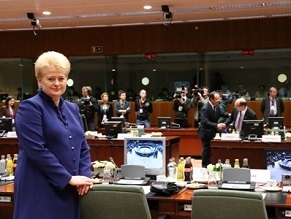|
World Jewish News

Lithuanian President Dalia Grybauskaite, whose country assumes the EU presidency until the end of the month
|
EU stuck in an impasse in negotiations with Ukraine but keeps doors open
20.12.2013, Jews and Society European leaders repeated this week that the doors for Ukraine to join the Association Agreement with the EU still remain open after Kiev’s decision to put on hold its EU association process last month in favour of closer relations with Russia.
Many heads of government underlined during the second day of the EU-summit in Brussels that Europe is still there to support the Ukrainians.
Lithuanian President Dalia Grybauskaite, whose country assumes the EU presidency until the end of the month, said: “Europe is open to the Ukrainian people. But not necessarily for this government. That is the message.”
‘’Our offer of political association and closer trade ties is till on the table,’’ EU Council President Herman Van Rompuy told journalists after the summit. ‘’We are willing to sign, as soon as the country is ready,’’ he added, while European Parliament Martin Schulz said: “We believe that it is better to keep the door open for negotiations with Ukraine. That should be done, at the very least, on account of the pro-democracy movements in the country, which we must not leave in the lurch.’’
Brussels diplomats, however, regretted that the EU was not able to succeed in this “geostrategic issue”. New opportunities would only offer themselves when Ukraine suffered the consequences of Moscow’s policy, they said.
Ukrainian President Viktor Yanukovych met with Russian President Wladimir Putin on 17 December after which Russia promised to reduce the price of natural gas exports to Ukraine by a third and lend 15 billion dollars to its former Soviet ally.
An EU official said yesterday that the EU offered Ukraine a more lucrative deal. Over a period of seven years the country could receive financial support of 26 billion dollars.
Although exact numbers have not been named in order not to enter into a “bidding competition” for Ukraine, the President of the European Parliament’s Foreign Affairs Committee, Elmar Brok, said “the dimension of the EU’s offer was known to Viktor Yanukovych for months”.
EU Commissioner Stefan Füle promised at a press briefing in Brussels with Ukraine's deputy PM Serhiy Arbuzov that the EU is ready to “step up” financial aid for implementing EU laws, to “top up” International Monetary Fund loans, and to “help bring on board other international partners,” such as the World Bank, if Ukraine says Yes.
He noted that “the … backdrop for our efforts is the looming financial crisis in Ukraine.”
The Commissioner criticized that further work on the agreement would be on hold, because President Yanukovych’s “words and deeds are further and further apart.” Consequently, there would have to be clear signals before a resumption of negotiations.
During her two-day visit to Kiev, EU’s foreign affairs Chief Catherine Ashton pleaded for a dialogue between the government and the opposition during a meeting with President or Yanukovych.
“More than anything, the message that I've been giving over these last days has been the importance of dialogue and the importance of listening to what people are saying. I think the people of this great country deserve better,” Ashton said.
While political negotiations between the EU and Ukraine are stuck in an impasse, the demonstrations in Kiev’s Independence Square – know as ‘EuroMaidan’- continue.
Members of Ukraine’s Jewish community have expressed concern that anti-Semitic sentiment could rise in the country amid the ongoing protests.
Eduard Dolinsky, director of the Ukrainian Jewish Committee, said that he has not heard of any attacks against Jews, but protesters affiliated with the Ukrainian political opposition nationalistic party Svoboda have been calling for the death of “enemies” of Ukraine, with chants similar to those used by Ukrainian Nazi collaborators.
The Ukrainian Jewish Committee warned local communities that they should remain neutral in the political conflict, Dolinsky said.
Speaking on behalf of Oleksandr Feldman, an Independent Member of the Ukrainian Parliament in Yanukovich’s governing coalition, Dolinsky said that they have encouraged Jews to “increase security everywhere, at every public Jewish place.”
“We communicated a message to every community independent of religious or community affiliation,” he said. “There can be a provocation at any moment.”
Feldman, he said, “is afraid of provocations and his only goal is to maintain the peace of all the forces and all the parties and especially to protect the Jewish community and minorities who can be vulnerable in this time.”
by: Justyna Laskowsk. Yossi Lempkowicz contributed to this report.i
EJP
|
|
